Marshal de Rais: King’s best friend, Blue-Beard,
Fairy Tale Perrot
The famous French writer Charles Perrault and his son Pierre first published history about the villain Bluebeard in the collection “The tales of Mother Goose”. This book appeared in the 1697 year and instantly became popular. Children from all over Europe read out interesting works of the Frenchman. But one story was especially impressive - about the bloodthirsty villain of Bluebeard.
It is believed that Bluebeard did not appear on an empty place. The prototype of the villain was one of the outstanding people of France, the hero of the Hundred Years War and the ally of the famous Joan of Arc. But overnight, from a positive character, he turned into a negative one. Just imagine, the marshal of France was blamed on forty-seven points! And they led him to the fire as a heretic, a murderer of children and a sorcerer.
But before unraveling the tangle of evil de Re, is a small digression. Most philologists who have studied European fairy tales believe that Bluebeard is a collective character. At least two people played a role in his appearance. And the baron only completed the formation of the image of the literary villain. More precisely, not even de Re himself, but his trial and execution. Over time, they overlapped the older story, which came either from French Brittany or from the Celtic regions of Britain. Indeed, in those parts long ago there was a legend about the bloodthirsty Count Conomore. In a fairy tale, he married Trephinia. And at first, the girl’s father did not want this marriage and refused “because of the extreme cruelty and barbarism with which he treated his other wives, who, as soon as they became pregnant, ordered to kill in the most inhuman manner”. Thus, the graph’s behavior was described in the Life of the Saints of Brittany. But one way or another, Conomor was able to achieve his goal. Under the abbot, who became a witness, the count solemnly swore that he would behave with dignity with the new wife. As it turned out, he was deceiving. As soon as Trephinia announced her pregnancy to her husband, he instantly changed his attitude towards her. There were legends about Conomore as if he worshiped some ancient pagan god, who demanded pregnant women to sacrifice. Therefore Trefinia failed to escape the sad fate: the count and her killed. But then something happened that he did not expect. The wife rose from the dead and punished Conomor for all heavy sins. And she became a saint.
This legend is very reminiscent of Perro’s tale of Bluebeard. And at the time when Baron de Rais lived, the story of Conomore was common. And in the future, two stories merged together. Therefore, in Perrault, the Marshal of France killed just the wives, not the children. But it was precisely in their death that the hero of the Hundred Years War was blamed.
This is how Charles described the villain’s appearance: “Once there was a person who had beautiful houses in the city and in the village, dishes, gold and silver, all the furniture in embroidery and carriages, were gilded from top to bottom. But, unfortunately, this man had a blue beard, and she made him so nasty and so scary that there was not a single woman or girl who would not run away when he saw him. ” From the very beginning it becomes clear that a beard is a kind of sign that symbolizes evil. The real de Re also wore a beard. So Perro's verbal portrait hinted at the prototype.
Curiously, at the time of the writer, almost all of the destroyed castles near Nantes were considered to be the former possessions of de Re. And local residents told him one interesting legend. Once, Count Odon de Tremeac and his fiancee Blanche de Lerminier drove past the realm of the Baron. De Re invited them to visit. As soon as the couple was in the castle of Baron, Gilles ordered to put the count in prison. And Blanche, he offered a hand and a heart. The frightened girl, of course, refused. But the baron was stubborn. He grabbed her and carried her to the nearest church, where he swore that “he would give her body and soul forever,” if she became his wife. Such an oath made a strong impression on Blanche, and she agreed. But at the same moment de Lerminier turned into a devil, which is interesting, blue. He laughed and said, "Now you are in my power." After that, the baron’s beard turned blue. And the devil continued: “Now you will not be Gilles de Laval. You will be called Bluebeard! ”
So the war hero with the British became the main villain of all of France. And the blue beard is the seal of evil spirits.
So what did the baron do such a terrible thing?
Way to glory
It is not exactly known when Gilles de Rais was born in the castle of Mashkul on the border of Brittany and Anjou. It is believed that the most likely date of birth is 1405 year. De Re belonged to the old and noble family, which gave France more than a dozen marshals and several constables.
How was the childhood of the Baron, is unknown. No evidence of this has been preserved. For the first time he "emerges" at the age of eleven. Then his father Guy de Laval, Baron de Rais, died. How this happened, history is again silent. According to one version, de Laval laid down his head in some of the battles, according to another - a long-time enemy had dealt with him in a duel. Mother Gilles and his younger brother Renee lost even earlier. Child custody took grandfather Jean de Craon. On the basis of the surviving information, we can conclude that de Craon spent a lot of effort, time and money to give his grandchildren a good education. Moreover, the emphasis was not on military subjects, as was customary at that time, but on the humanities and exact sciences. Attachments grandfather paid off handsomely. When Gilles grew up, he spent a lot of money on replenishing his library and buying antique items. Of course, it didn’t do without the obligatory noble attributes of that time: Gilles fenced perfectly and loved to go hunting.
Another interesting thing: it is known that Baron de Rais was married only once. His chosen one was Catherine, granddaughter of the Viscount de Tuar. Thanks to this marriage, Gilles received as a dowry several million livres, as well as land in Poitou, together with the Chateau de Tiffas. By the way, this fortress will subsequently play a significant role in the life of the baron. Only one child was born to Gilles - the daughter of Marie de Laval.
And if the baron didn’t particularly pay attention to his wife because of constant important affairs, he always found time for his main love, money. Huge financial capabilities de Re ordered cleverly and skillfully. For example, he strongly supported the young heir to the throne, Prince Carl Valois. And thanks to this patronage, he managed to get a coveted place in his retinue.
Interesting: the Dauphin and the Baron were almost the same age. But the prince was not distinguished by financial prudence. Youth and high status obliged him to live in a big way. He adored pathetic and pompous balls, as well as no less shocking hunting trips. Such a load could not withstand even the seemingly bottomless wallet of a prince. In addition, the prospect of the throne for Valois was foggy. In those turbulent times, almost half of France was under the boot of the British and their faithful "dogs" - the Burgundians. The same part of the country, which remained free, was controlled by local feudal lords, who, of course, did not want to share power with anyone. In general, the prince had an unenviable fate. He kept only a few cities in the Loire Valley. At the same time he was afraid to leave his residence - Chishon Castle. Karl was seen everywhere traitors, spies and murderers, who wanted him to die.
But the visionary Baron de Rais made a bet on Carl Valois. He understood that the prince with his help would be king. It was necessary only to show wisdom, patience, and also to provide him with a financial leverage.
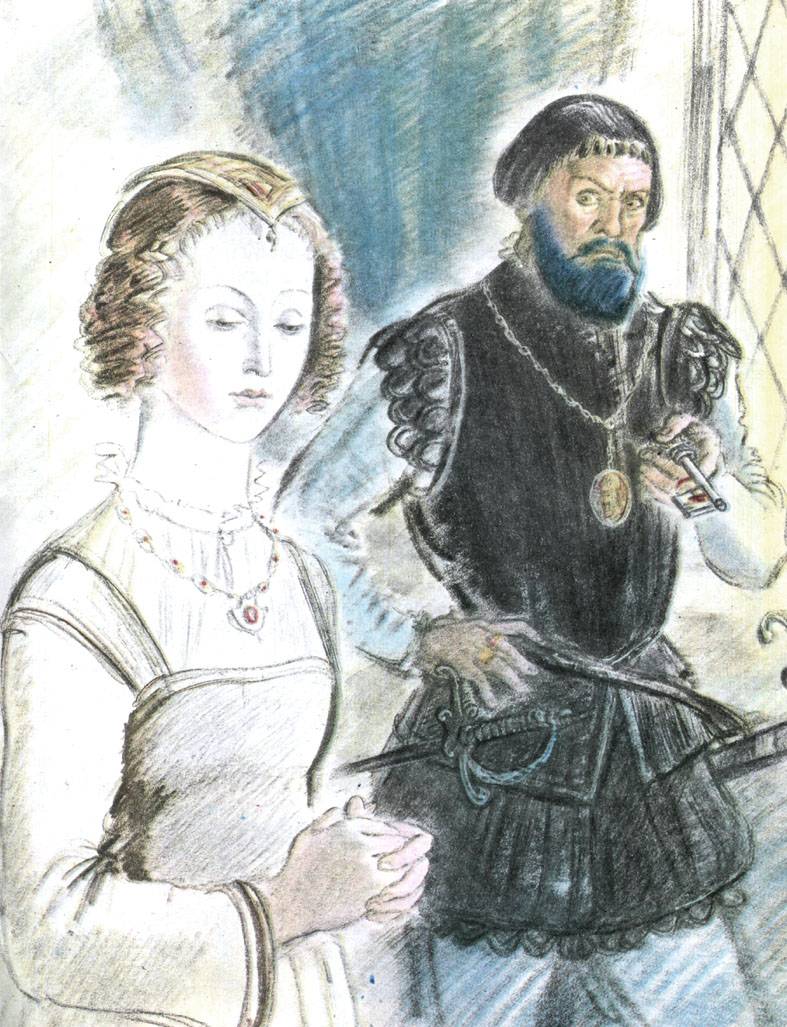
Hero of France
Gilles de Rais was a descendant of the famous warlord Bertrand Dughesklen, who died in the 1380 year. During the life of Dugesklen, the English were called the thunderstorm, and de Rae dreamed of the glory of his heroic ancestor.
Therefore, Gilles did not spare money for the armed forces. Together with them, from 1422 to 1429 years he made successful forays into the rear of the enemy. In addition to the rich booty de Ree also managed to seize several castles. But his finest hour came during the battles of Orleans and Zharzho. Here the Baron fought hand in hand with Joan of Arc. The military successes of the twenty-five de Re could not go unnoticed. And he became the youngest marshal in the history of France. Of course, he had enough envious. They claimed that Carl Valois made him a marshal in gratitude for his tremendous financial support. But nevertheless no one openly dared to question Gilles' military successes: he was more expensive.
In May, 1429, after the victory at Orleans, the war with the British began to change in favor of the French and Charles. And in July, the prince went to Reims for the coronation. I must say, Reims - a sacred place for all French monarchs. After all, it was here that they received the crown since 498 year.
And here Baron de Rais made the first strategic mistake in his life: he had believed in victory before his time. After all, he had no doubt that the power will not go anywhere from Karl. So, it was time to remind the newly minted monarch about the numerous debts. But Karl reacted to the words of a friend aggressively. The crown completely wiped out the story of friendship with the baron from the head of a young monarch. Karl firmly believed that he managed to get power without anyone's help. And if so, then it can hold it alone. Therefore, the marshal immediately fell into disgrace and was expelled from the royal court.
From hero to sorcerer
Karl in the 1433 year sent de Re in retirement. What happened hit the baron hard. He locked himself in the castle of Tiffezh and became interested in books on alchemy. In this mysterious and mysterious science, Gilles saw the only possibility of salvation from the inexorably approaching bankruptcy. Indeed, after the betrayal of the king, his financial well-being was in doubt. But he could not change the situation due to the paid debt.
Apparently, being in a completely hopeless situation, de Re made a decision, which later destroyed him. In 1436, Gilles opened the doors of his castle to Louis, the new heir to the throne. And he met him too cordially, as the future king and old friend. Baron de Rais did not even suspect that Louis had already begun to weave a network of intrigues against his father. And his visit to Tiffozh was caused only by the desire to hide from the enraged royal relative for a while. Gilles did not know about their hostility, respectively, did not understand in time that the reception of the dauphin would hammer the last nail into the lid of his coffin ... After all, the "check" with which Louis allegedly came was only a tricky trick. Thus, the prince killed two birds with one stone: he hid from his father and framed his possible ally. After all, as you know, to achieve the cherished goal you need to insure on all fronts.
When Karl learned that his former comrade hid the disgraced dauphin in himself, he began to act swiftly. He believed that Gilles betrayed him and decided to take revenge by a palace coup, making a bet on the young prince. Nuts were tightened as much as possible. To survive, the baron had to start mortgaging his property ... And suddenly the king ordered the imposition of restrictions on commercial operations de Re. Simply put, the baron could no longer sell his locks. It was the beginning of the end.
In a panic, Gilles tried to find a way out. But in his presentation he was only one: to achieve results in the study of alchemy. Only by turning lead into gold could one be saved from imminent bankruptcy. The personal alchemist Baron de Sille was ordered to do only this science and not to waste time on other “projects”. Under the laboratory for the experiments, the entire first floor of the Tiffej Castle was completely rebuilt. The baron with fanatical stubbornness spent the last money on his alchemist and the purchase of "witchcraft" ingredients. For example, arsenic, shark teeth, mercury ...
But as time went on, the money ran out, but there was no result. In a fit of madness, de Re drove his alchemist from the castle and called for a new one, Francesco Prelati. Unlike de Sille, who honestly tried to find a recipe for gold and was devoted to his master, the Italian was a professional charlatan. Taking advantage of de Re's depressed and broken fortune, he managed to convince the former Marshal of France of his uniqueness. He "finished off" him with confessions of witchcraft and the fact that he was holding a manual demon named Barron. And thanks to the hellish beast, he has access to the world of the dead, who share wisdom with him and serve in every way possible.
At that time, the baron already had a bad idea and hardly understood that the protection of Prelati was a terrible crime. Since it was already talking about the affairs that were under the control of the Inquisition. And the inquisitors did not care who was caught in heresy: a poor peasant or a comrade-in-arms of the Maid of Orleans.
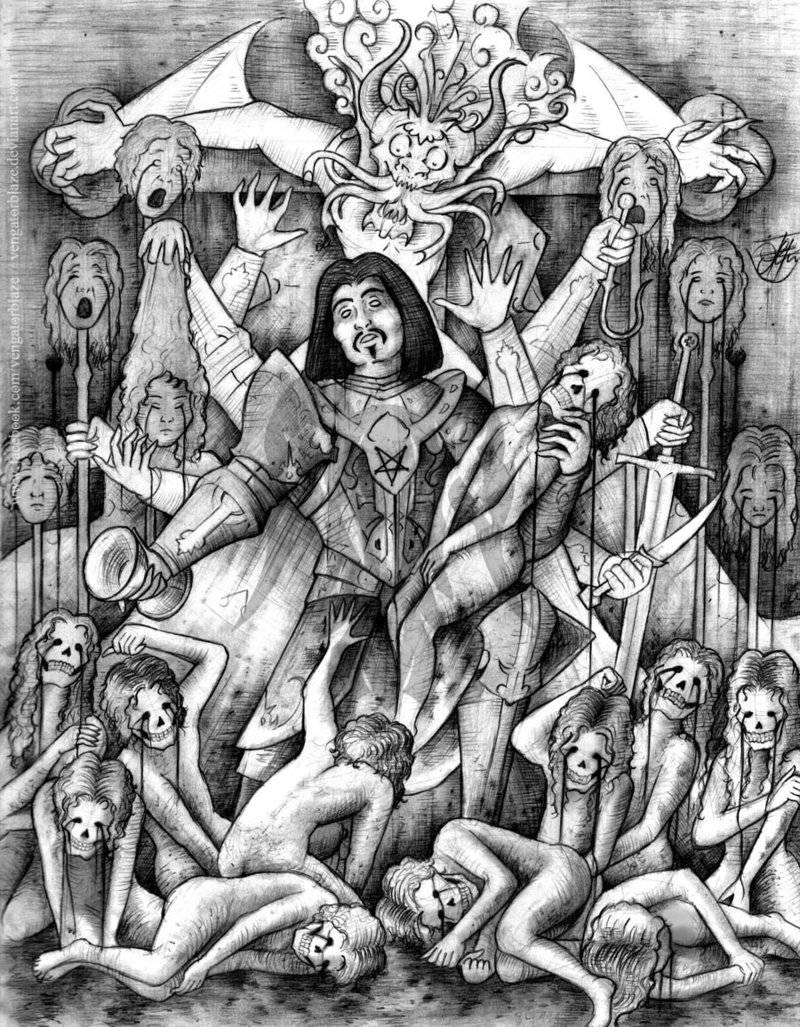
Soon, Prelati and de Re changed places. Now the sorcerer ruled over the Baron. What exactly the charlatan did on the ground floor of the castle is not known for certain. However, soon all the neighborhoods were full of various rumors. And some speculations were worse than others. About the horrors that take place in Tiffège, the Duke of Breton soon also learned, because de Re was his vassal. Gathering a detachment of several hundred soldiers, he went to the castle to find out what is wrong with Gilles.
The main villain of France
At the end of August, 1440, in the cathedral, the bishop of Nantes, Jean de Maleestruhe, delivered a sermon. In his speech, he told the parishioners about the horrors that he and the duke of Breton had seen in the castle of the baron. The bishop said that a noble nobleman committed crimes "against young children and teenagers of both sexes." He also demanded not to be silent if someone knew something about the activities of the baron. Jean de Maleestruhe spoke so heartfelt that none of the parishioners even had the thought that he could deceive. The fact is that no serious and solid evidence against de Rais was found during the search of his castle. Yes, and with the disappearance of children was not so smooth. Only one disappearance of a child, which happened a month before these events, could be associated with the possession of the marshal. Since there was no direct evidence, the enemies of de Ree were most likely to use the opportunity to share it with him once and for all.
Not postponing the case in the back box, Jean de Maledestru told everything to Father Jean Bluin, the head of the Inquisition Tribunal of Brittany. That, in turn, also worked quickly. And within a few days, an indictment was drawn up against de Rais, including forty-seven points. The baron was accused of human sacrifice to the fiend of hell, witchcraft "with the use of special technical means", murders of young children, committed with sophisticated cruelty, as well as sexual perversions. This act of Bluene sent to the chief inquisitor of France Guillaume Merici and the duke of Breton. And in September, Gilles de Rais was summoned to the episcopal court to testify. Baron was stunned by such a list of accusations, but could not avoid meeting with the Inquisition. Although he understood that nothing good awaited him there. And if the accusation of the disappearance of children was not supported by any weighty evidence, then the whole district knew about his sorcery. Traders rarities, of course, confirmed that Baron bought up for a lot of money "witchcraft goods." Such a church did not forgive anyone. And de Re could not hope for her favor because of the longstanding feats of arms.
He had no options for salvation. One could, of course, secretly come to Paris and pray to King Charles VII for help, recalling to him the stories of friendship and betrayal. But de Re did not do that. Apparently, he understood that the king would rather come up with new points of accusation than help.
And the baron agreed to attend the meeting at the appointed hour. And if he still retained even the semblance of calm, his approximate composure did not differ. Marshal's friend, Roger de Brickville, together with the former chief alchemist de Sillet, suddenly disappeared. Immediately, rumors spread that they were on the run to escape punishment for their atrocities. The prosecutor of Brittany, Guillaume Chapeyon, ordered the fugitives to be wanted.
The disappearance of two close barons allowed Chapeillon to legally visit the Chateau de Re. The visit turned out to be more than successful for the prosecutor. The alchemist Prelati (who for some reason did not dare to escape, although he was threatened by the fire of the Inquisition) and both of Baron’s bodyguards, Griar and Korio, could not stand the pressure. Their arrest was paramount, because they were the closest people of de Re. So, they could tell a lot of interesting and important details.
Neither the charlatan nor the bodyguards blocked the owner. At the trial, which took place in the Nantes Town Hall, they gave exhaustive testimony. It is curious that everyone was allowed to attend the meeting, and the confessions of the Baron’s associates were announced in all the cities of Brittany.
During the hearing, which was attended by the Baron himself, viewers defiantly tried to break through the ranks of the guards to spit at de Rey or throw a stone at him. The Baron stood with dignity, listening to the confessions of the alchemist and his bodyguards.
Prelate under oath said that his master in blood signed an agreement with the demon Barron, under which he pledged to offer human sacrifice to the fiend. In return, Barron promised to give the marshal three gifts: power, wealth, and omniscience. Prelati also admitted that de Re had first tried to buy off the demon with birds and animals, but he demanded precisely the blood of young children.
By the way, the alchemist de Cille was also brought to trial. He told that his former owner mocked the children in every way, adored diabolical experiments and was a real heretic.
Then it was the turn to speak witnesses. The inconsolable parents, choking on tears, vied with each other about their children, who were disappearing, as soon as they were in the possession of the villain. To the question: “Why were they sent there?”, The answer was one: “To beg.”
Then they listened to the bodyguards. They admitted that de Rais collected a collection of children's skulls. She was kept in a special room, where the baron forbade anyone to go. When they were interested in the Inquisition, bodyguards on the orders of de Ree personally destroyed these heads to cover their tracks. Therefore, they were not found during the searches.
But the baron did not give up. He continued to talk about his innocence and demanded a lawyer. By the way, he was constantly denied a lawyer, referring to the gravity of the crimes. In the end, de Re said that he would voluntarily go to the gallows, because they specifically want to accuse him of heresy, without providing any compelling evidence. And the testimony of witnesses - a lie, knocked out of people by torture of inquisitors. The behavior of the Baron outraged the Bishop of Nantes. And he excommunicated de Rais from the church and ordered him to be tortured in order to “induce him to stop the vile denial”.
Gilles de Rais was tied to a wooden lattice and began to stretch like on a rack. Nobody endured such bullying. The Baron also surrendered. He confessed everything and repented. After the torture, the barely living marshal of France knelt before the bishop and asked to be returned to his death in the bosom of the church. Then he publicly talked about conspiring with the devil and about the murder of children. He even called the number of victims - more than eight hundred. But the Inquisition considered that so many corpses to anything. Baron was allowed to confess to the killing of one hundred and fifty children ...
At the end of October, the 1440 of the year the baron was once again excommunicated for such “grave sins against the tenets of faith and the laws of man that it is impossible for man to imagine them.” Then the alchemist de Sille and the bodyguards went to the stake. And since de Re repented and reconciled with the church, they decided to strangle him before burning. Still, sending to the fire a live Marshal of France and a comrade-in-arms of Joan of Arc was too much even for the Inquisition.
The execution took place on October 26 1440 on the square near the Nantes Cathedral. The executioner strangled the Baron, and then set fire to the brushwood under the body. But literally in a few seconds the lifeless de Re was transferred to relatives. I must say, the relatives intimidated by the inquisition did not bury him in the family crypt. Gilles de Rais was “hidden” under a nameless slab in a Carmelite monastery located on the outskirts of Nantes.
The fact that the baron was slandered and framed is confirmed by the "dampness" of the case. Numerous inconsistencies in the charges, the testimony of witnesses obtained during the torture, the ban on the lawyer - all this suggests that someone from the powerful in this world purposefully tried to get rid of de Re. Whether this is Carl or Louis is no longer possible to learn. The reasons were both. The first did not want to return a huge debt. And the second was afraid of his intercession at a possible palace coup.
By the way, the Italian alchemist is the only one who managed to get off, as they say, with a slight fright. For some reason, he was sentenced not to death, but to imprisonment. Where he soon escaped and safely disappeared in the expanses of Europe. It looks very, very suspicious.
***
In 1992, the French scientists were able to achieve a new trial of Baron Gilles de Rais. "Death Court" was held in the Senate of the French Republic. After studying all the surviving documents that were found in the archives of the Inquisition, the tribunal decided: to fully justify de Re. And that court is declared illegal and falsified. Justice triumphed after 552. But in the fairy tale and folk memory, Gilles de Rais will probably forever remain a terrible villain named Bluebeard.

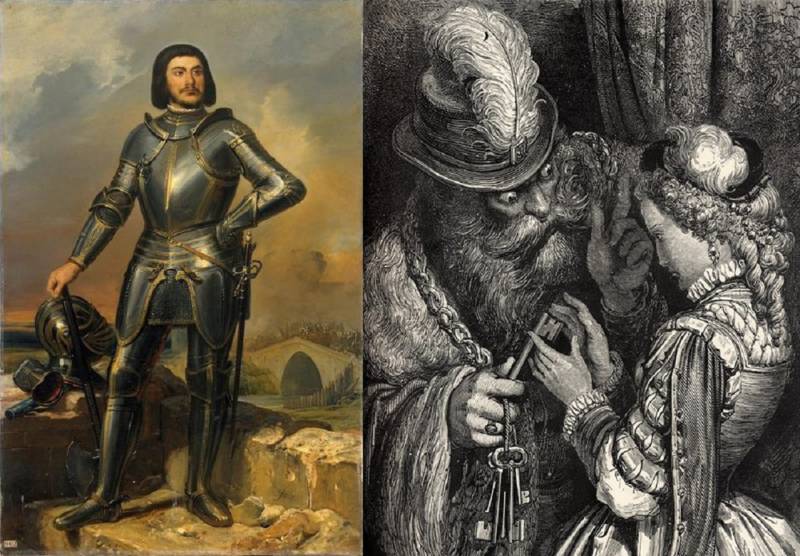
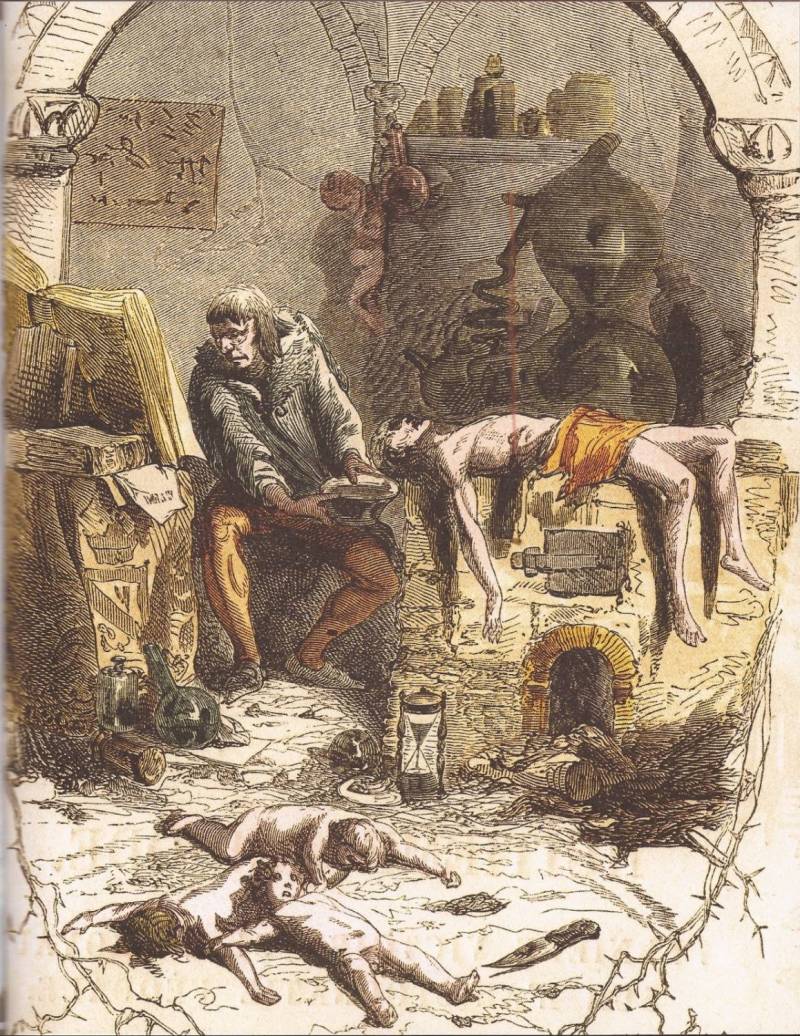
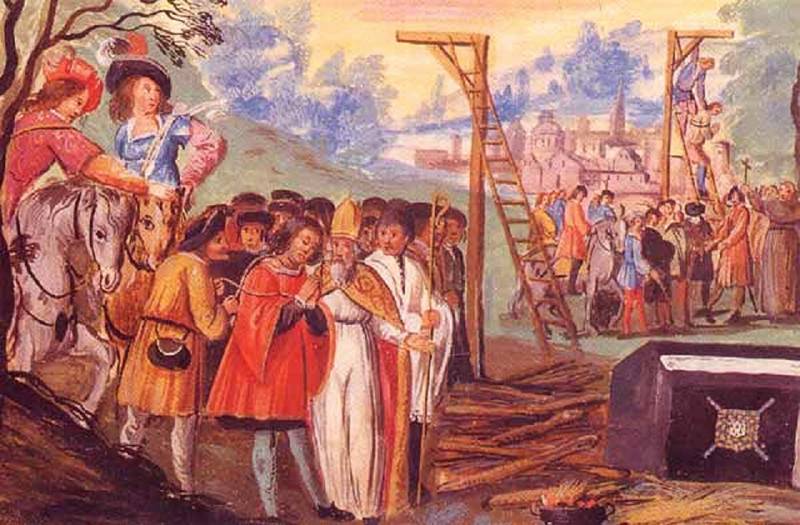
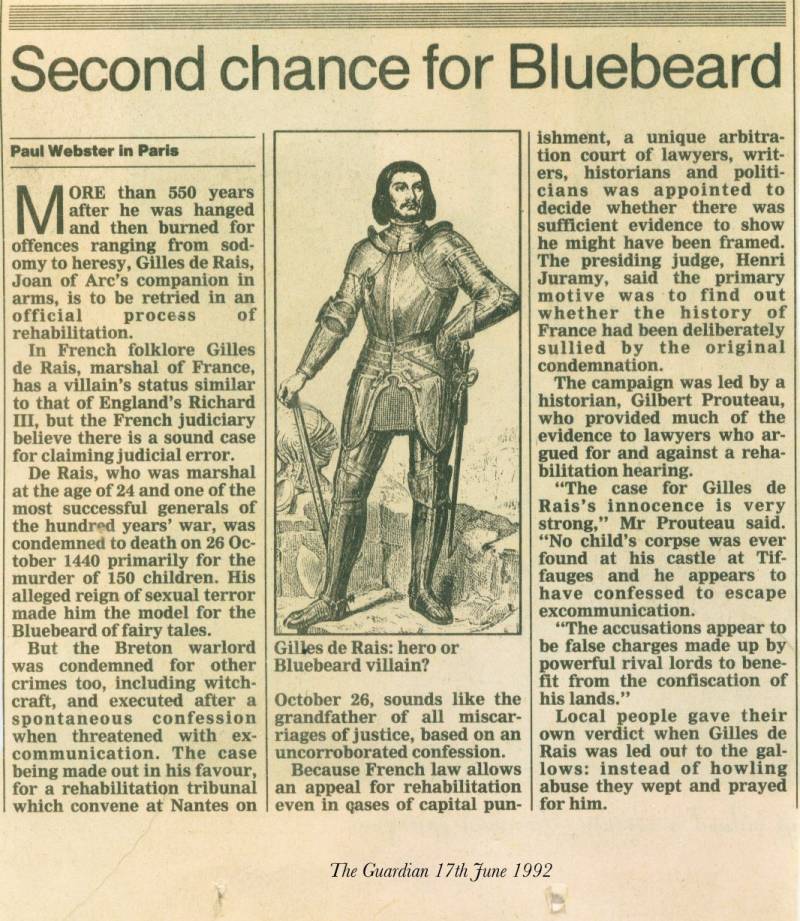
Information